Managing a supply chain is more challenging than ever. Delays, rising costs, and changing customer demands can make or break a business. That’s where Supply Chain Management (SCM) SaaS tools come in—they help companies stay organized, save time, reduce waste, and deliver products faster.
According to Gartner, the global supply chain software market is expected to cross $24 billion by the end of 2025, showing how quickly businesses are shifting to cloud-based solutions. A 2024 Deloitte survey also revealed that 79% of supply chain leaders are investing in AI-driven platforms to improve efficiency and reduce risk.
Whether you’re a small business owner or part of a global enterprise, choosing the right supply chain software can give you a big competitive edge. In this article, we’ve listed the 10 best Supply Chain Management SaaS platforms in 2025, each designed to help you plan smarter, move faster, and grow stronger.
How Supply Chain Management SaaS Tools Are Transforming Modern Businesses
- From Reactive to Predictive Decision-Making: Traditional systems respond after a disruption occurs. Modern SaaS tools like warehouse management system (WMS) use AI and data to predict delays or shortages before they happen, allowing companies to stay one step ahead.
- Connecting Global Supply Chains Seamlessly: These platforms enable real-time collaboration across borders, helping businesses coordinate with suppliers, warehouses, and logistics partners across time zones and languages.
- Reducing Environmental Impact: Smart planning and optimized logistics help reduce waste, fuel use, and emissions. Many tools now include sustainability metrics to help companies meet eco goals.
- Empowering Non-Technical Teams with Data: With intuitive dashboards and visual reports, even non-technical staff can track KPIs, spot issues, and contribute to decisions without needing advanced IT skills.
- Faster Crisis Response and Recovery: Whether it’s a pandemic, port closure, or supplier issue, SaaS platforms offer tools for instant scenario planning so businesses can adapt and reroute quickly.
Factors to Watch Out for When Choosing a Supply Chain Management SaaS
- Overly Complex Setup: If the tool requires long implementation times, heavy IT support, or constant configuration, it might become a bottleneck instead of a solution.
- Lack of Customization Options: A one-size-fits-all approach won’t work for every business. If you can’t tailor workflows or dashboards to match your operations, it could limit productivity.
- No Offline Access or Mobile Optimization: If your teams work on the move or in low-connectivity areas (like warehouses or remote locations), ensure the software works on mobile and offers offline features.
- Hidden Fees in Pricing Models: Watch out for platforms that charge extra for integrations, analytics, or additional users. Always ask for a clear pricing breakdown before committing.
- Limited Support or Training Resources: A strong onboarding experience, helpful documentation, and responsive customer support are critical—especially when scaling or facing technical issues.
Top 10 Best Supply Chain Management SaaS
1. Coupa (Llamasoft)
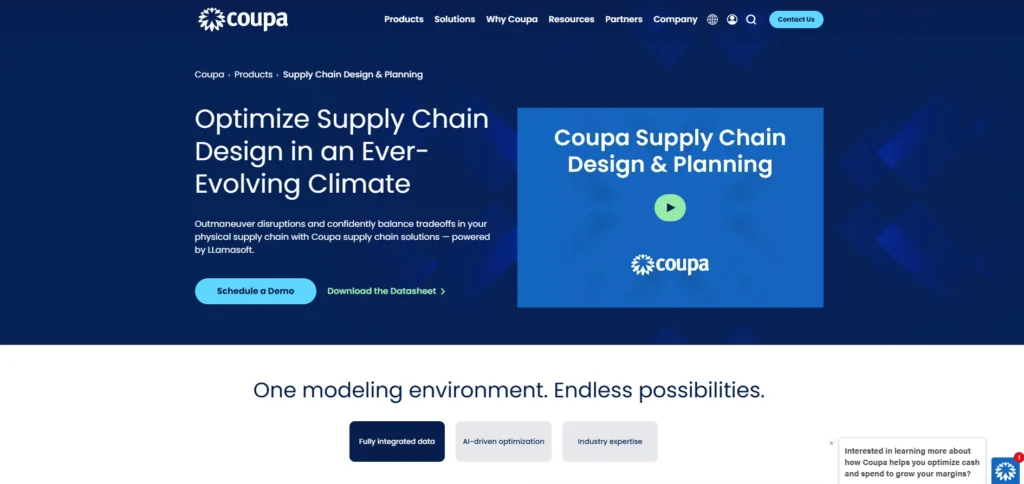
Llamasoft operates as a Coupa subsidiary to offer its position as a major supply chain design and decision platform which utilizes AI technology. The platform allows business operations to create digital models of worldwide supply chains which then generate simulations and optimize their operation through digital twin software. Llamasoft enables organizations to perform strategic planning as well as conduct scenario analysis and optimize supply chain networks with its tool.
The platform stands out because it offers strong analytic power together with robust simulation functions. Organizations use their platforms to model potential situations such as supplier delivery failures and demand fluctuations before actual events take place. The tool brings exceptional benefits to complex supply chains operated at enterprise scale which require both speed and understanding of their operations.
Key Features:
- Supply chain modeling and digital twins
- Scenario planning and simulation
- AI/ML-based decision support
- Network design and optimization
- Seamless integration with Coupa spend platform
Website: https://www.coupa.com/products/supply-chain-design/
Pricing: Available on request
2. ToolsGroup SO99+
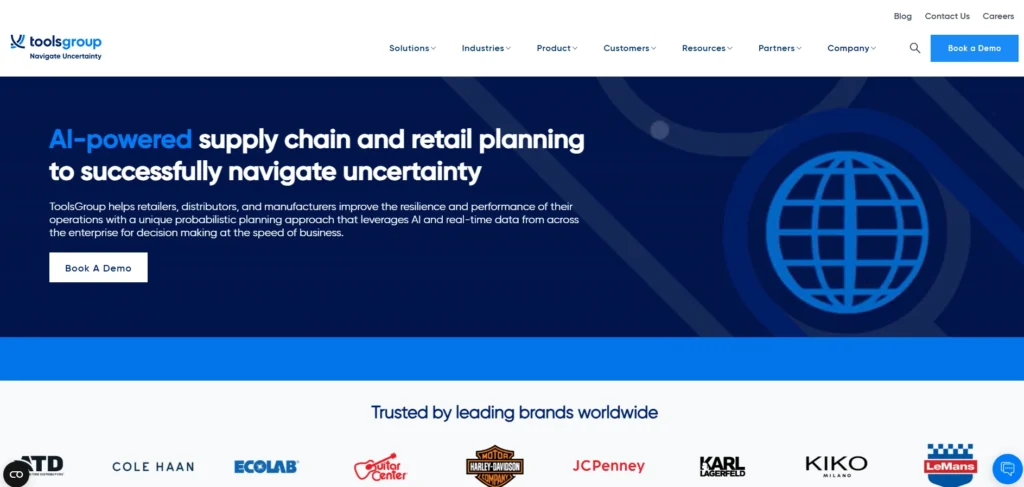
ToolsGroup’s SO99+ is a specialized supply chain planning tool that uses AI to optimize inventory, forecast demand, and improve service levels. It is intended for companies that require highly automated, data-driven decision-making for intricate international supply chains.
SO99+ helps companies manage erratic demand and cut down on surplus inventory by emphasizing automation and minimizing manual intervention. With sophisticated simulations and scenario modeling, it covers industrial, distribution, and retail settings.
Key Features:
- AI-powered demand sensing and forecasting
- Inventory and replenishment optimization
- Service-level-driven planning
- Advanced simulations and what-if scenarios
- Integration with ERP and other supply chain systems
Website: https://www.toolsgroup.com/
Pricing: Available on request
3. Logility
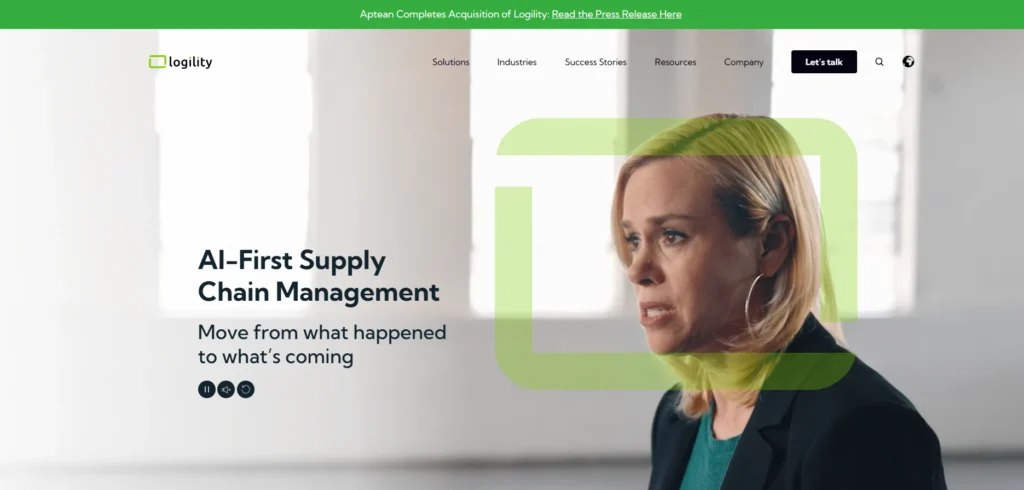
The digital supply chain platform Logility helps companies optimize their inventory systems through various tools which improve demand planning while streamlining supply chain activities. AI analytics and automated features from Logility enable corporations to link their production to customer requirements at reduced expenses and enhanced customer experience.
Logility focuses on simple implementation processes and quick deployment time which makes the platform ideal for companies of medium to large sizes. Logility provides organizations with predictive modeling capabilities and data visualization tools that allow teams to achieve smarter and faster decisions for supply chain operations.
Key Features:
- Demand and inventory planning
- Integrated business planning (IBP)
- Supply chain visibility and risk management
- AI/ML analytics and forecasting
- Supply optimization and S&OP
Website: https://www.logility.com/
4. E2open
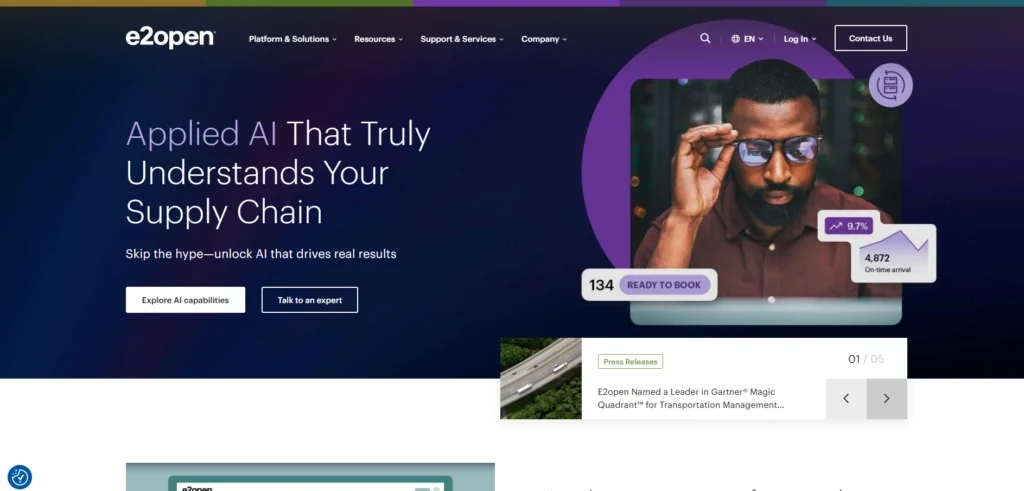
E2open delivers a connected supply chain platform which handles planning and execution functions through its intelligent system. This platform combines data from multiple sources including company and external entities throughout worldwide supply networks in order to deliver real-time business intelligence with decision tools.
E2open excels at networking multiple organizational systems together. The software platform of E2open provides its customers with modules for demand sensing alongside inventory optimization and transportation logistics and global trade compliance features. The agile and reach-oriented SaaS platform of this company receives trust from high-tech companies and those operating in the CPG industry and life sciences.
Key Features:
- Multi-enterprise network collaboration
- Global trade and compliance tools
- AI-powered demand and supply planning
- Real-time tracking and alerts
- Custom workflow automation
Website: https://www.e2open.com/
Pricing: Available on request
5. Infor Supply Chain Management

The modern cloud-based supply chain suite Infor SCM provides businesses with specialized tools to maximize their operation performance across the entire supply chain. The software operates from Infor OS infrastructure on AWS cloud while implementing machine learning along with analytics and artificial intelligence for present-time insight and decision-making features.
The software company Infor provides business solutions designed for manufacturing, healthcare, retail and logistics industries. The Infor SCM system gives deep functional abilities together with cloud scalability through its warehouse management and supplier collaboration modules and demand forecasting features.
Key Features:
- End-to-end supply chain visibility
- Integrated demand and supply planning
- Warehouse and transportation management
- AI/ML-based predictive analytics
- Industry-specific templates and configurations
Website: https://www.infor.com/solutions/scm
Pricing: Available on request
6. Manhattan Active Supply Chain
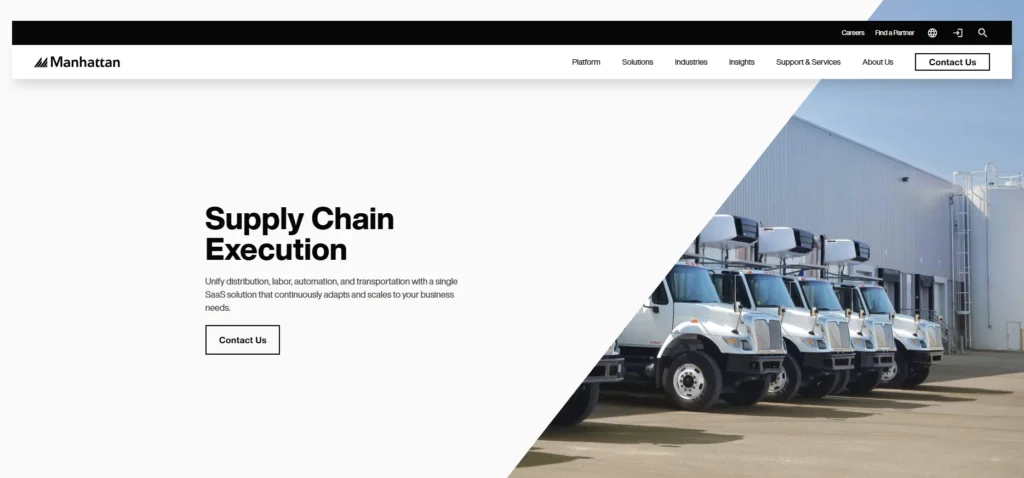
Manhattan Active is a cloud-native supply chain suite that provides solutions for transportation, distribution, and inventory management. It is designed for enterprises that demand real-time orchestration, optimization, and execution of complex supply chain functions.
What makes Manhattan Active stand out is its microservices architecture, enabling continuous innovation without system downtime. It’s widely used in retail, grocery, and third-party logistics (3PL) industries. Users benefit from AI-powered automation, omnichannel fulfillment, and advanced analytics.
Key Features:
- Real-time transportation and warehouse management
- Microservices architecture for scalability
- Intelligent order fulfillment
- Omnichannel inventory visibility
- Native mobile support
Website: https://www.manh.com/en-in/our-solutions/supply-chain-management-software
Pricing: Available on request
7. Kinaxis RapidResponse
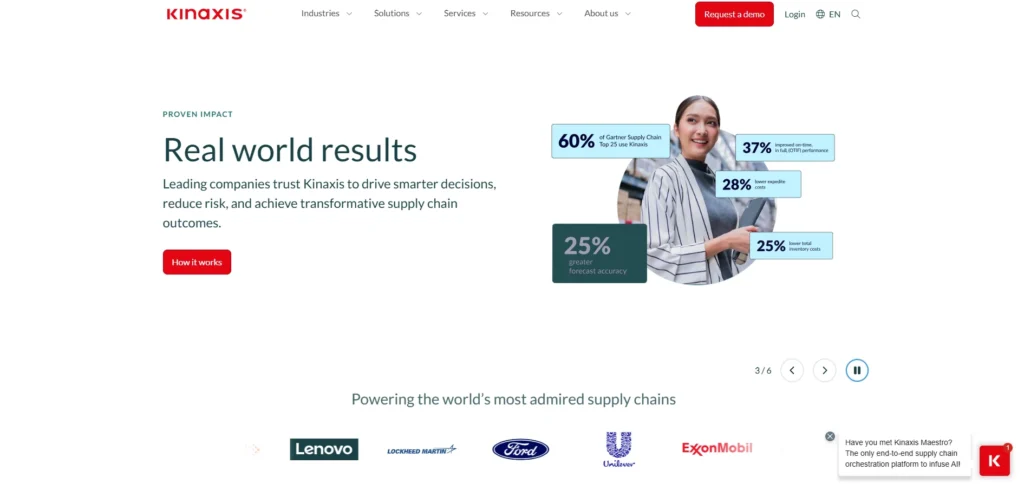
Through its concurrent planning engine Kinaxis RapidResponse allows companies to perform supply chain collaboration while planning scenarios in real time. This application stands out because of its swift performance along with agile functionality and analytical capabilities which establishes it as the leading software solution for complex supply chain management.
A major benefit of Kinaxis is its capacity to function with different ERP systems which allows departments to connect together effortlessly for data integration. S&OP together with demand planning and inventory optimization and risk mitigation benefit from the implementation of this platform by businesses. Deploying this application through cloud infrastructure allows immediate installation with exceptional scalability capabilities.
Key Features:
- Concurrent supply chain planning
- Real-time collaboration and analytics
- Integration with SAP, Oracle, and other ERPs
- Risk management and scenario analysis
- Fast deployment with low-code capabilities
Website: https://www.kinaxis.com/
Pricing: Available on request
8. Blue Yonder
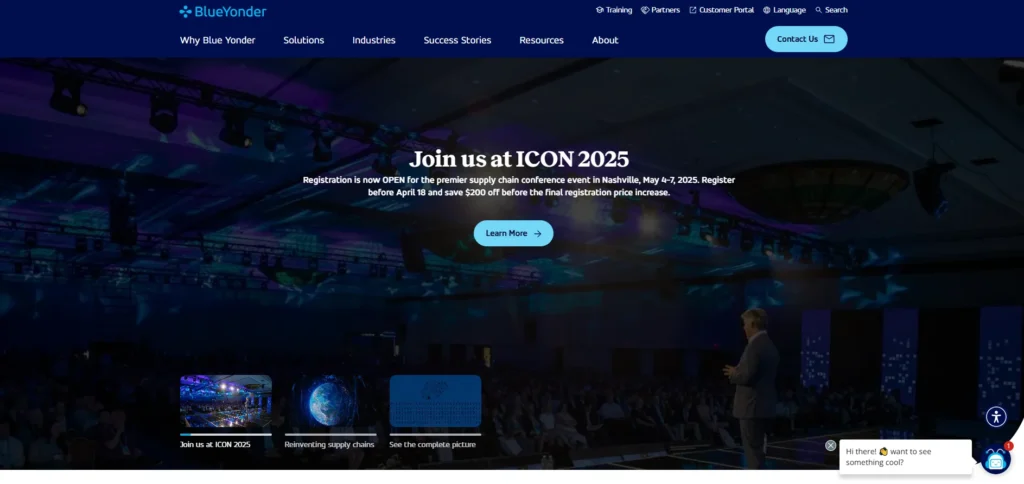
Blue Yonder is a leading AI-driven supply chain management SaaS that offers end-to-end solutions for demand planning, transportation, and warehouse management. It leverages machine learning algorithms to forecast demand and optimize supply chain networks proactively.
With a focus on automation and cognitive decision-making, Blue Yonder helps organizations minimize disruptions and manage volatility. The software is widely used in retail, manufacturing, and logistics sectors due to its precision and flexibility. Its cloud-native platform ensures fast deployment and seamless updates.
Key Features:
- Demand planning and forecasting
- Supply chain visibility and control tower
- AI/ML-driven automation
- Inventory and fulfillment optimization
- Industry-specific solutions
Website: https://blueyonder.com/
Pricing: Available on request
9. Oracle Fusion Cloud Supply Chain Management

Oracle Fusion SCM is a comprehensive cloud solution that manages the end-to-end supply chain process including procurement, product lifecycle, logistics, and order management. It’s built on Oracle’s Fusion Cloud platform, delivering agility and responsiveness for modern, dynamic supply chains.
This SaaS platform is ideal for businesses aiming for global supply chain orchestration. Oracle’s embedded AI and advanced analytics provide actionable insights to reduce disruptions, improve supplier collaboration, and enhance fulfillment efficiency. The user-friendly interface and scalability make it a favorite among large and mid-sized enterprises.
Key Features:
- AI-powered demand forecasting
- Inventory and warehouse management
- Supplier collaboration tools
- Procurement and logistics tracking
- Integrated with ERP and finance tools
Website: https://www.oracle.com/scm/
Pricing: Available on request
10. SAP Integrated Business Planning (SAP IBP)
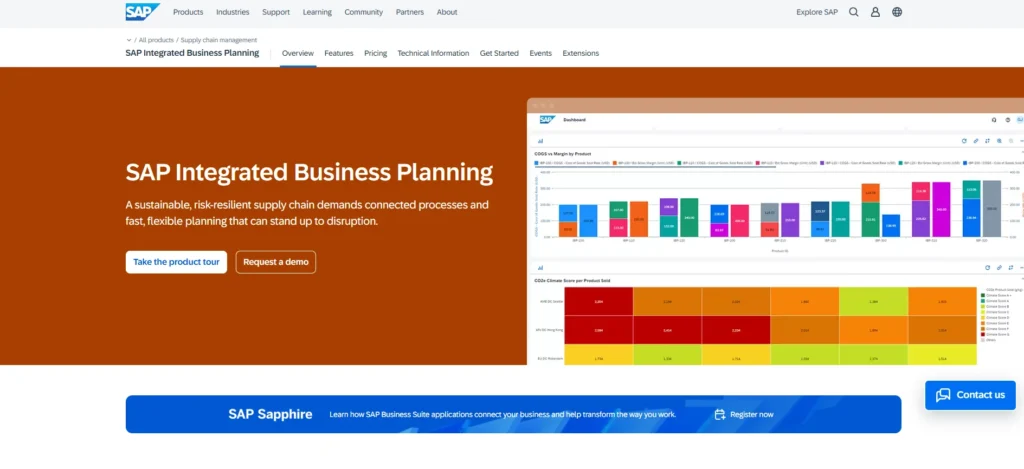
Using SAP IBP as a cloud platform enables organizations to leverage predictive analytics and machine learning and collaborative features as part of their supply chain management capabilities in a single comprehensive system. The system provides practical supply chain planning with demand forecasting and inventory optimization capabilities in real time mode. All teams attain operation effectiveness through SAP IBP by achieving unified supply chain visibility across the entire system.
Users gain the power to make proactive decisions through SAP IBP because it provides real-time scenario simulation capabilities. Through SAP IBP organizations can execute sales and operations planning and demand-driven replenishment while performing supply planning. Industrial businesses that require extensive scalability together with complete system visibility choose SAP IBP as their platform of choice.
Key Features:
- Real-time analytics and dashboard
- Scenario simulation and forecasting
- Demand, supply, and inventory planning
- Tight integration with SAP S/4HANA and ERP
- AI/ML for predictive insights
Website: https://www.sap.com/india/products/scm/integrated-business-planning.html
Pricing: Available on request
Conclusion
In conclusion, selecting the appropriate Supply Chain Management SaaS can significantly impact how efficiently your company operates. Planning more effectively, avoiding delays, cutting expenses, and maintaining customer satisfaction are all possible with the correct tool. Whether it is managing warehouses, predicting demand, or enhancing supplier relationships, each piece of software has its own advantages. Consider your budget, your unique needs, and the size of your company before choosing one. Investing in a good SaaS tool can help you grow faster and handle challenges more easily in today’s fast-changing market.
FAQ
Is it expensive to use supply chain SaaS tools?
Pricing varies a lot depending on the features, number of users, and company size. Some tools offer flexible pricing for smaller businesses, while others are tailored for large enterprises with custom quotes. Most offer free demos or trials to help you decide.
Can these tools help prevent supply chain disruptions?
Yes, many of these platforms use real-time data, AI, and analytics to detect risks early—such as delays, shortages, or supplier issues. They help you make quick decisions and adjust your plans to avoid major disruptions.
Do I need technical knowledge to use supply chain SaaS platforms?
Not necessarily. Most tools are designed with user-friendly dashboards and guided workflows. However, depending on the complexity of the platform, some initial training or onboarding may be needed, especially for advanced planning or analytics features.



